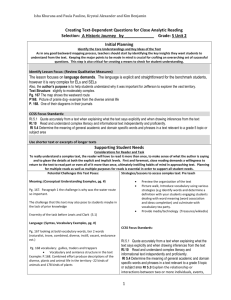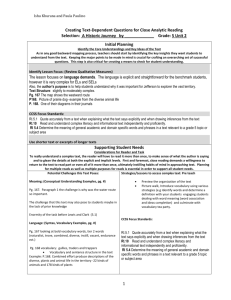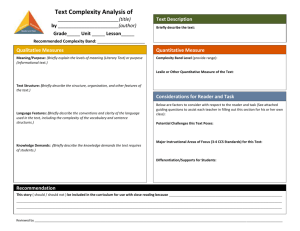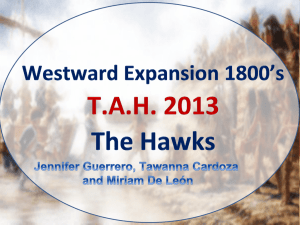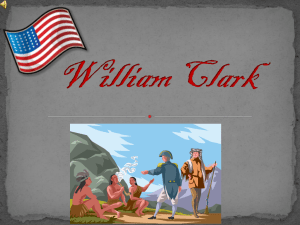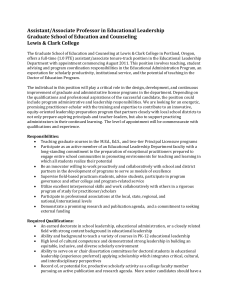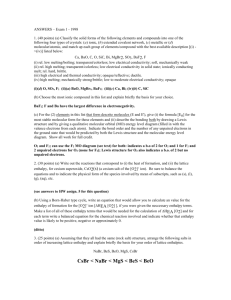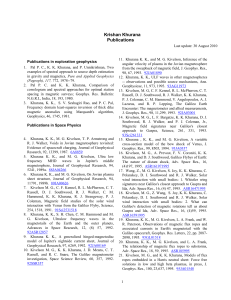A Historic Journey Placemat
advertisement
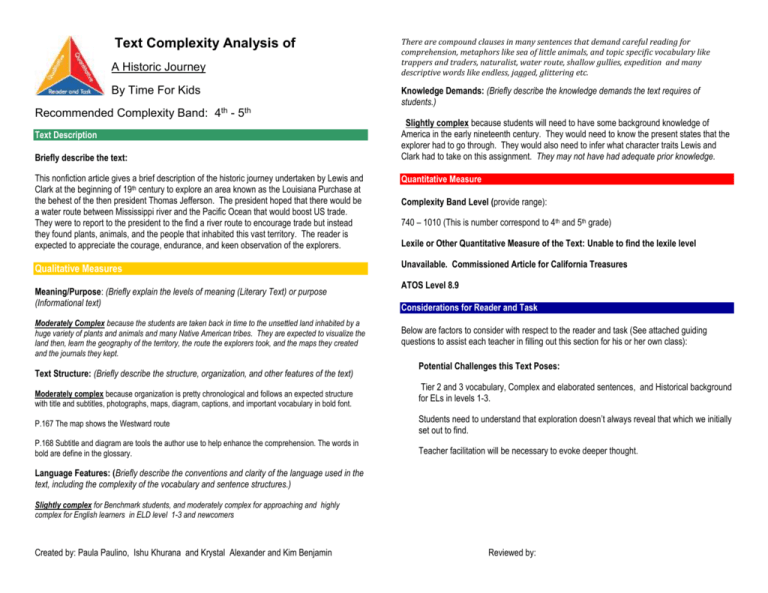
Text Complexity Analysis of A Historic Journey By Time For Kids Recommended Complexity Band: 4th - 5th Text Description Briefly describe the text: There are compound clauses in many sentences that demand careful reading for comprehension, metaphors like sea of little animals, and topic specific vocabulary like trappers and traders, naturalist, water route, shallow gullies, expedition and many descriptive words like endless, jagged, glittering etc. Knowledge Demands: (Briefly describe the knowledge demands the text requires of students.) Slightly complex because students will need to have some background knowledge of America in the early nineteenth century. They would need to know the present states that the explorer had to go through. They would also need to infer what character traits Lewis and Clark had to take on this assignment. They may not have had adequate prior knowledge. This nonfiction article gives a brief description of the historic journey undertaken by Lewis and Clark at the beginning of 19th century to explore an area known as the Louisiana Purchase at the behest of the then president Thomas Jefferson. The president hoped that there would be a water route between Mississippi river and the Pacific Ocean that would boost US trade. They were to report to the president to the find a river route to encourage trade but instead they found plants, animals, and the people that inhabited this vast territory. The reader is expected to appreciate the courage, endurance, and keen observation of the explorers. Quantitative Measure Qualitative Measures Unavailable. Commissioned Article for California Treasures Meaning/Purpose: (Briefly explain the levels of meaning (Literary Text) or purpose (Informational text) Moderately Complex because the students are taken back in time to the unsettled land inhabited by a huge variety of plants and animals and many Native American tribes. They are expected to visualize the land then, learn the geography of the territory, the route the explorers took, and the maps they created and the journals they kept. Text Structure: (Briefly describe the structure, organization, and other features of the text) Moderately complex because organization is pretty chronological and follows an expected structure with title and subtitles, photographs, maps, diagram, captions, and important vocabulary in bold font. Complexity Band Level (provide range): 740 – 1010 (This is number correspond to 4th and 5th grade) Lexile or Other Quantitative Measure of the Text: Unable to find the lexile level ATOS Level 8.9 Considerations for Reader and Task Below are factors to consider with respect to the reader and task (See attached guiding questions to assist each teacher in filling out this section for his or her own class): Potential Challenges this Text Poses: Tier 2 and 3 vocabulary, Complex and elaborated sentences, and Historical background for ELs in levels 1-3. P.167 The map shows the Westward route Students need to understand that exploration doesn’t always reveal that which we initially set out to find. P.168 Subtitle and diagram are tools the author use to help enhance the comprehension. The words in bold are define in the glossary. Teacher facilitation will be necessary to evoke deeper thought. Language Features: (Briefly describe the conventions and clarity of the language used in the text, including the complexity of the vocabulary and sentence structures.) Slightly complex for Benchmark students, and moderately complex for approaching and highly complex for English learners in ELD level 1-3 and newcomers Created by: Paula Paulino, Ishu Khurana and Krystal Alexander and Kim Benjamin Reviewed by: Major Instructional Areas of Focus (3-4 CCS Standards) for this text: Rl.10 Read and understand complex literacy and informational text independently and proficiently. Recommended Placemat: Briefly explain the recommended placement of the text in a particular grade band. RI 5.5 (Compare and contrast the overall structure (e.g. chronology, comparison, cause/effect, problem/solution) of events, ideas, concepts, or information in two and more texts) We would recommend the placement of this book for 5th grade at the beginning of second semester. This piece of literature would fit within the 5th grade band. The information contained would fit well with the grade theme of Our Nation. The understanding from the previous year RI.5.1 Quote accurately from a text when explaining what the text says explicitly and when drawing inferences from the text Differentiation/Supports for Students s We Supporting ELs: Visuals, academic vocabulary strategies, sentence frames, TM (Multi Flow Map) videos Develop an understanding of the language use, patterns, and the geographic regions Students will need to have some background knowledge of America in the early nineteenth century. They should know the states the route covered, what kind of explorers will take on this assignment. P. 167 Vocabulary word naturalist has no apposition and teachers would need to give students a strategy to clear understanding its meaning. Supporting SELs: visuals, academic vocabulary strategies, sentence frames, TM ( Multi Flow Map) videos Benchmark Students/High Achiever: In addition to the above, they will role play and create a dialogue between the president and Lewis Meriwether. (how the president may have approached Lewis, and how Lewis may have responded) between Lewis and Clark and the two tribes they met, and between Lewis and Clark and the people who went with them. Created by: Paula Paulino, Ishu Khurana and Krystal Alexander and Kim Benjamin Reviewed by:
